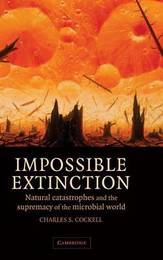
|
Impossible Extinction: Natural Catastrophes and the Supremacy of the Microbial World
Hardback
Main Details
| Title |
Impossible Extinction: Natural Catastrophes and the Supremacy of the Microbial World
|
| Authors and Contributors |
By (author) Charles S. Cockell
|
| Physical Properties |
| Format:Hardback | | Pages:200 | | Dimensions(mm): Height 235,Width 160 |
|
| Category/Genre | Popular science
Astronomy, space and time
Microbiology (non-medical) |
|---|
| ISBN/Barcode |
9780521817363
|
| Classifications | Dewey:579.138 |
|---|
| Audience | |
|---|
| Illustrations |
11 Plates, color; 27 Halftones, unspecified; 1 Line drawings, unspecified; 11 Plates, color; 27 Halftones, unspecified; 1 Line drawings, unspecified
|
|
Publishing Details |
| Publisher |
Cambridge University Press
|
| Imprint |
Cambridge University Press
|
| Publication Date |
3 March 2003 |
| Publication Country |
United Kingdom
|
Description
Every 225 million years the Earth, and all the life on it, completes one revolution around our Milky Way Galaxy. During this remarkable journey, life is influenced by calamitous changes. Comets and asteroids strike the surface of the Earth, stars explode near by, enormous volcanoes erupt, and more recently, humans litter the planet with waste. Many animals and plants become extinct during the voyage, but humble microbes, simple creatures made of a single cell, survive this journey. This book takes a tour of the microbial world, from the coldest and deepest places on Earth to the hottest and highest, and witnesses some of the most catastrophic events that life can face. Impossible Extinction tells this remarkable story for the general reader explaining how microbes have survived on Earth for over three billion years.
Author Biography
Charles Cockell is a microbiologist with the Search for Extraterrestrial Intelligence Institute (SETI). He is based at the British Antarctic Survey in Cambridge, UK.
ReviewsAdvance praise: 'Here chronicled, in an most entertaining style, is a remarkable journey into the remote reaches of life's long history - to an ancient world populated by microbes and their kin that have miraculously survived even to the present day. Well-researched. Riveting. A delightful read. And brought to us by Charles Cockell, one of the world's emerging experts on this history of earthly life and our best possible guide for this fascinating story.' Professor J. William Schopf, UCLA Center for the Study of Evolution and the Origin of Life 'This book is an engaging and perilous adventure story of the 225 million year journey of Earth around our home Galaxy, the Milky Way. It contains a vivid description of the many hazards Earth could encounter. The 'heroes' of this adventure are the microorganisms whose remarkable adaptability has arisen from previous hazards that could, in turn, protect them from even greater hazards in the future. It will fascinate the general reader and astrobiologists alike.' Dr Baruch S. Blumberg, Former Director of the NASA Astrobiology Institute 'A fascinating and beautifully-researched account of the dangers that threaten life on our planet during a galactic year - Earth's 225 million-year trek around the centre of the Milky Way. By the end of the book, you'll be wishing that you were a microbe in order to survive.' Dr Heather Couper Past-President, British Astronomical Association '... worth reading. A highlight is the discussion of why we should not generalize too much from the actual state of the Earth ... [recommended] to the lay reader ... can also be quickly read by a professional astrobiologist.' Nature '... stimulating ... not too long, generally well informed and written in a reader-friendly style. It will appeal to general readers as well as to scientists who like to reflect outside their own specializations.' John Postgate, Nature Medicine 'This is an informative, serious yet humorous book written in a chatty, colloquial style ... I recommend reading this fascinating account of the status, importance and prevalence of the microbial world.' Journal of the British Astronomical Association 'Impossible Extinction can be seen as a highly readable primer on the basics of the new discipline of astrobiology. Impossible Extinction will be of interest to a wide audience and will do yeoman's service in introducing a new generation to questions that have become prominent in interdisciplinary research over the past 30 years.' Endeavour 'Inspirational for anyone considering the possibility of life out there, Earth scientists will enjoy Cockell's infectious (!) enthusiasm for microbes as an apparently impossible Extinction.' The Open University Geological Society Journal 'Only rarely a book is published in a specific field of science that is (also) of great interest to researchers in other disciplines (in this case, the earth sciences). This book is one of them. ... the book is pleasant reading and is never dull. ... the book is highly interesting, particularly for those who have to do with early life, with microbial paleontology or with present-day ecology.' Journal of Sedimentary Research 'Only rarely a book is published in a specific field of science that is (also) of great interest to researchers in other disciplines (in this case, the earth sciences). This book is one of them. it deals with microbes (in the broadest sense), their history on Earth, their possible distribution in the universe and their great ability to survive catastrophes that make many other organisms extinct.' Journal of Sedimentary Research
|